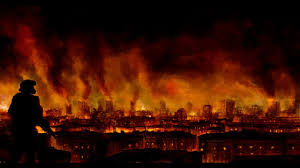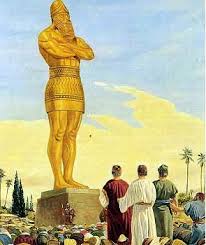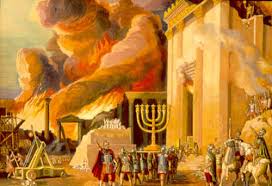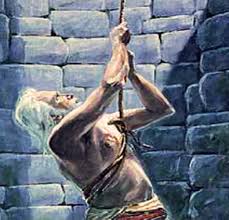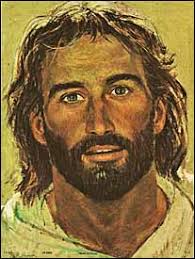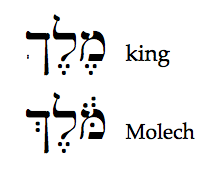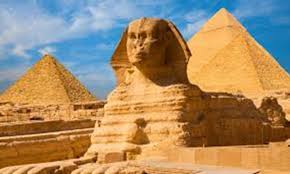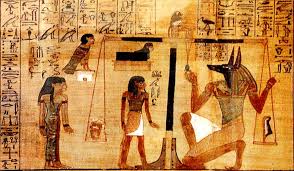Gg – Gedaliah Assassinated Jeremiah 40:7 to 41:15 and Second Kings 25:22-25
Gedaliah Assassinated
Jeremiah 40:7 to 41:15 and Second Kings 25:22-25
Gedaliah assassinated DIG: What were the surviving Israelites afraid of? Why did the Jewish refugees from the war return to Y’hudah? What are their alternatives? What was Ishma’el’s plan? Why would Baalis, king of the Ammonites, support the assassination plot? Why did Gedaliah find such a plot unbelievable? What is Gedaliah’s “fatal flaw?” Why did the eighty Samaritans come to Judah (Jeremiah 16:6-7)? Why did Ishma’el ambush them (41:7-8)? What political statement was made by filling King Asa’s cistern with the dead (First Kings 15:16-22)? To this day, Jews commemorate the assassination of Gedaliah with a day of fasting. Why do you think this event was so significant?
REFLECT: Do you think Gedaliah was right not to make a preemptive strike on Ishma’el? Why or why not? What else could he have done to protect himself? Are you a good judge of character? What kind of things influences your impressions? Have you ever seriously misjudged someone’s intentions towards you? Is there any situation in which you are tempted to take matters into your own hands and rid yourself of the person you can’t get along with? If running away from your problems or striking first doesn’t solve your problem, what does?
586 BC during Gedaliah’s three-month reign
This is a straightforward account of the brief and tragic history of Gedaliah’s reign as governor. What is most striking about this narrative is that Yirmeyahu is completely absent. Nothing is said in the story that leads to any theological interpretation. The narrative traces the tragic events after the fall of Jerusalem. One may conclude that the violence and chaos seen here are the residue of a civilization that had long imagined herself to be autonomous and free to do whatever she wanted.
Gedaliah’s rule in Mizpah: When all the Judean guerrilla leaders and their men who were still in the open country heard that Nebuchadnezzar king of Babylon had appointed Gedaliah son of Ahikam as governor over the Land and had put him in charge of the men, women and children who were the poorest in the Land and who had not been carried into exile to Babylon, they met Gedaliah at Mizpah (Jeremiah 40:7). It is clear that Gedaliah came from one of the most powerful and respected families of Jerusalem politics. His grandfather Shaphan and his father Ahikam had taken positions sympathetic to Jeremiah. Gedaliah seemed to have been sober enough to be trusted by Babylon and stable enough to be trusted by his own people.
Gedaliah’s political position was tenuous and delicate. He and the other surviving Judeans were forced by circumstances to come to terms with the power of Babylon. They had been defeated and had no bargaining power. Zealots in such a situation quickly become irrelevant. The best course of action for Gedaliah was to cooperate with their occupiers, but be vigilant for the well-being and independence of the people. It seems reasonable that he sought to occupy this middle ground and was well respected among his people.
These verses portray the initial consolidation of Gedaliah’s authority. The military was in no position not to deal with him. They had no choice. When Gedaliah’s appointment as governor became known, various guerilla units in the field began to come to Gedaliah with their men to assess the situation. The various leaders were Ishma’el son of Nethaniah, Johanan and Jonathan the sons of Kareah, Seraiah son of Tanhumeth, the sons of Ephai the Netophathite, and Jaazaniah the son of the Maakathite, and their men (Jeremiah 40:8; Second Kings 25:22-23). Of these, the first named, Ishma’el and Johanan, will be the most prominent in the narrative to follow.
Gedaliah received the guerrilla leaders and outlined his policy. He took an oath to reassure them and their men, saying, “Do not be afraid to serve the Babylonians. You will not be taken captive if you would submit to my authority, settle down in the land and serve the king of Babylon.” Gedaliah said, “I myself will stay at Mizpah to represent you before the Babylonians who come to us, but you are to harvest the wine, summer fruit and olive oil, put them in your storage jars and live in the towns you have taken over (Jeremiah 40:9-10; Second Kings 25:24). Gedaliah assured them that he would not represent the Babylonians to the Jews, but that he would represent the Jews to the Babylonians. This showed his strength and resolve to be a faithful and independent agent over the Judean state that he had been chosen to lead. This hints at the suspicion with which he and his office must have faced.361
When all the Jewish refugees in Moab, Ammon, Edom and all the other countries heard that the king of Babylon had left a remnant in Judah and had appointed a Jew (and not a Babylonian), Gedaliah son of Ahikam, the son of Shaphan, as governor over them, they all came back to the land of Judah, to Gedaliah at Mizpah, from all the countries where they had been scattered. They accepted his authority and returned to a certain amount of normalcy, and harvested an abundance of wine and summer fruit (Jeremiah 40:11-12). His moderate government was the best option available, though the arrangement must have been discouraging, even crushing, to those who had treasured memories of better days and who had unrealistic ambitions.
Gedaliah’s modest, moderate regime seemed to give concrete form to Jeremiah’s expectations. The prophet had avoided both bold independence and excessive subordination to Babylon. And Gedaliah seemed to strike the right balance. He was both prudent and pragmatic. This is what Jeremiah had been saying for years and years.
The warning to Gedaliah: Gedaliah’s government was not only fragile, but, as it turned out, short-lived. He had been appointed by the Babylonians and had visible support from Jeremiah. The people seemed to be on board, but there were political factions who were not. There were deeply felt ideological, partisan disagreements. Some felt he was too loyal to Babylon and smelled betrayal. Would he have succeeded if given the time? We’ll never know.
Johanan, a loyal supporter of Gedaliah, was the spokesman for all the army officers. They came to Gedaliah at Mizpah, and said to him, “Don’t you know that Baalis king of the Ammonites has sent Ishma’el son of Nethaniah to take your life?” Gedaliah’s family were servants in the royal house of Zedekiah; now Ishma’el, who was of royal Jewish blood, was being asked (in his own twisted mind) to submit to someone who should be serving him! Perhaps he was only an opportunist. But it seems clear that Baalis must have gotten in Ishma’el’s ear about it and convinced him that Gedaliah’s death would benefit both of them.
But Gedaliah did not believe Johanan. Perhaps during this time of transition and consensus building, Gedaliah wanted to stand for unity and did not want to acknowledge division or vulnerability. He was a pragmatic man and did not act on whims. So this was more likely a calculated political judgment, one that had enormous implications for the future. The courage of Gedaliah and the political decision to disregard the known threat is not unlike the decision of President John F. Kennedy to go to Dallas in 1963, where he was murdered. He made a decision on political grounds, with full knowledge of the danger.
Then Johanan said privately to Gedaliah in Mizpah, “Let me go and kill Ishmael and no one will know it. Why should he take your life and cause all the Jews who are gathered around you to be scattered and the remnant of Judah to perish?” Which was actually the effect of Gedaliah’s assassination. But Gedaliah made a political decision and said to Johanan, “Don’t do such a thing! What you are saying about Ishma’el is not true” and the offer was rejected (Jeremiah 40:13-16).
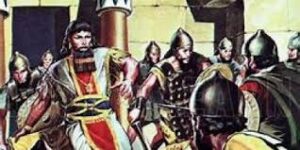
Ishma’el Assassinates Gedaliah: Baalis, king of Ammon, who resented the existence even of this small and feeble Jewish community, could not rest until he had dealt the final blow. Using Ishma’el of the defunct royal house as his tool, he had Gedaliah murdered. On Rosh Hashanah Ishma’el came to Gedaliah at Mizpah with ten men, ostensibly to celebrate the holiday with him. He was a descendent of Elishama, who was of royal blood and had been one of Zedekiah’s officers (41:1a). Gedaliah completely misread the situation and underestimated Ishma’el. Rosh Hashanah celebrates the start of the Jewish New Year. Supposedly a new beginning. But Judah’s new beginning would be shortcut by this vicious act of a traitorous coward.
We are told two important things about Ishma’el. First, if this is the same Elishama of First Chronicles 3:8 and 14:7, Elishama was a son of King David. Secondly, he was of royal blood. So it would seem that Elishama was a descendant of King David, which would mean that Ishma’el was also a descendant of King David through Elishama. It was incredibly selfish that Ishma’el, knowing full well that the assassination of the governor appointed by Nebuchadnezzar might result in the destruction of the remnant of Judah, would nevertheless commit such an act of treason.
Gedaliah received them as guests and gave them hospitality. This made the subsequent crime all the more atrocious. But while they were eating together there, Ishma’el and the ten men who were with him got up and struck down Gedaliah with the sword, killing the one whom the king of Babylon had appointed as governor over the Land. Ishma’el also killed all the men of Judah who were with Gedaliah at Mizpah, as well as the Babylonian soldiers who were there (Jeremiah 41:1b-3; Second Kings 25:25). This was merely a footnote, as it were, to the tragedy.
The narrative portrays Ishma’el in the most ruthless and despicable terms possible. He violated the hospitality of Gedaliah. He exploited a friendly public gesture from the governor and, in complete dishonor, violated the Torah (see the commentary on Exodus Dp – You Shall Not Murder). Gedaliah was a noble man who stands in stark contrast to Ishma’el, who is presented as nothing more than a thug, albeit a royal thug. Gedaliah attempted to set up a new Judean government so the people could regain their balance, but he had no chance. There was still active (though unrealistic) political opinion that believed Babylonian power could be thwarted even though Nebuchadnezzar’s boot was on their collective necks. The same unrealistic judgment that had earlier troubled Yirmeyahu so much had now destroyed a prudent and pragmatic response to the Babylonian reality. Consequently, Gedaliah’s brief effort at governance ended in a bloodbath.
The fast of Gedaliah is still celebrated by Jews today on the third day of the seventh month. The day after Rosh Hashanah is a public fast day in memory of Gedaliah’s tragic death and its disastrous aftermath. We fast every year on the third of Tishrei. If the third of Tishrei falls on Shabbat, the fast is postponed to the fourth of Tishrei. Like other “minor” fasts, it begins at dawn (alot hashachar) and ends at sunset. During the morning services, it is customary to add special penitential prayers (selichot). During both morning and afternoon prayers, the Torah is taken out of the ark and the portion of Exodus 32:11-14 and 34:1-10 in which YHVH forgives Isra’el for the sin of the golden calf is read. During the afternoon prayers, a haftorah is read from Isaiah 55:6 to 56:8. As it is written in Zechariah 8:19, Tzom Gedaliah is one of the four fasts that will be converted to joy and feasting with the arrival of Meshiach. May it happen soon.
Ishma’el, however, was not yet finished with his violence. He was an eager, ruthless man . . . and an increasingly desperate one. The day after Gedaliah’s assassination, before anyone knew about it, eighty men who had shaved off their beards, torn their clothes and cut themselves came from Shechem, Shiloh and Samaria, bringing grain offerings (see the commentary on Exodus Ff – The Grain Offering) and incense with them to the house of the LORD (41:4-5). Their visit reflected the continuing power and attraction of Jerusalem, even for those from the northern Kingdom. They came with good intentions and in innocence. They only knew of the Babylonian destruction of Yerushalayim, and they had come to grieve the wound of the City because they had shaved off their beards and torn their clothes. That gesture of solidarity, however, was ruthlessly exploited by Ishma’el.
However pious they were, it was obvious that they had been adversely affected by the Assyrian cult in the northern Kingdom because they cut themselves, which was a direct violation of the Torah (Leviticus 19:28, 21:5; Deuteronomy 14:1). They were bringing offerings to what was left of the Temple. Perhaps they took him by surprise. Perhaps Ishma’el wanted to keep the assassination of Gedaliah secret for as long as possible. In any case, their innocent, good intentions contrast with Ishma’el’s vile, negative intent.
The good intentions of the pilgrims contrast sharply with Ishma’el’s violence. He must have seen dust rising from a distance from their procession. He went out from Mizpah to meet them, weeping as he went, pretending to also be in mourning. When he met them, he said: Come to Gedaliah to pay your respects. When they went into Mizpah, Ishma’el and the men who were with him slaughtered them and threw them into a cistern (41:6-7). These eighty men must have been unarmed for so small a force to overtake and kill them. It is quite clear that Ishma’el would stop at nothing to secure what he wanted.
But ten of them were able to bribe their way out of certain death. They said to Ishma’el, “Don’t kill us! We have wheat and barley, olive oil and honey, hidden in a field.” It is a common custom in the Near East to use wells or cisterns for grain. In them the farmers store their crops of all kinds after the grain is threshed and winnowed. These cisterns are cool, perfectly dry and airtight. The top is hermetically sealed with plaster and covered with a deep layer of dirt. So for the sake of their food he let them alone and did not kill them with the others (Jeremiah 41:8).
Now the cistern where he threw all the bodies of the men he had killed along with Gedaliah was the one King Asa of Judah had made as part of his defense against King Baasha of Isra’el. Ishmael filled it with the innocent dead (Jeremiah 41:9). When these two men were kings they battled each other constantly (First Kings 15:16-22; Second Chronicles 16:1-6), and King Asa built this cistern to be able to withstand a siege from King Baasha. In their death, Ishma’el had killed off whatever chance there may have been for some measure of Jewish autonomy from Babylon’s authority.362
Ishma’el made captives of all the rest of the people who were in Mizpah – including Jeremiah and his scribe Baruch, Zedekiah’s daughters (38:23 and 43:6) along with all the others who were left there, over whom Nebuzaradan commander of the imperial guard had appointed Gedaliah. Ishma’el took them captive and set out to cross over to the Ammonites (41:10). The intent of Ishma’el was to take his captives over to his co-conspirator, Baalis, king of Ammon as hostages. In all probability those captives were to be sold as slaves to the Ammonites. Ishma’el would have become rich from the sale and was obviously doing it for material gain.
Ishma’el’s moment in the narrative is brief and ugly. He completed the devastation brought about by Nebuchadnezzar. It was as though he wanted to save Jerusalem from Babylon by destroying her. It was ironic that his misguided intervention was the last gasping measure of the old dynastic ideology that Yirmeyahu had for so long refuted.363
Johanan’s Response: With the death of Gedaliah, Johanan then emerged as a central figure to counter Ishma’el. When Johanan and all the army officers who were with him heard about all the crimes Ishma’el had committed, they took all their men and went to fight Ishma’el. They caught up with him near the great pool in Gibeon (Second Samuel 2:12-16), which is about a mile south of Mizpah. When all the people Ishma’el had taken with him by force saw Johanan and the army officers who were with him, they were overjoyed. All the people Ishma’el had taken captive at Mizpah turned (shuwb) and escaped over to Johanan (41:11-14). They perceived him as their savior and rescuer. He did not kill Ishma’el, but he did end his moment of terror.
But Ishma’el and eight of his men escaped from Johanan and fled to the Ammonites, never to be heard from again (41:15). In the Jewish calendar of feasts, Rosh Hashanah leads to Yom Kippur, a day of judgment (Yom Ha’Din) and remembrance (Yom Ha’Zikkaron). Ishma’el slaughtered Gedaliah on Rosh Hashanah, and just as assuredly as Yom Kippur follows Rosh Hashanah, Ishma’el’s judgment found him in Ammon. Just as Gedaliah is remembered each year on the day after Rosh Hashanah with a fast, Ishma’el is forgotten.




